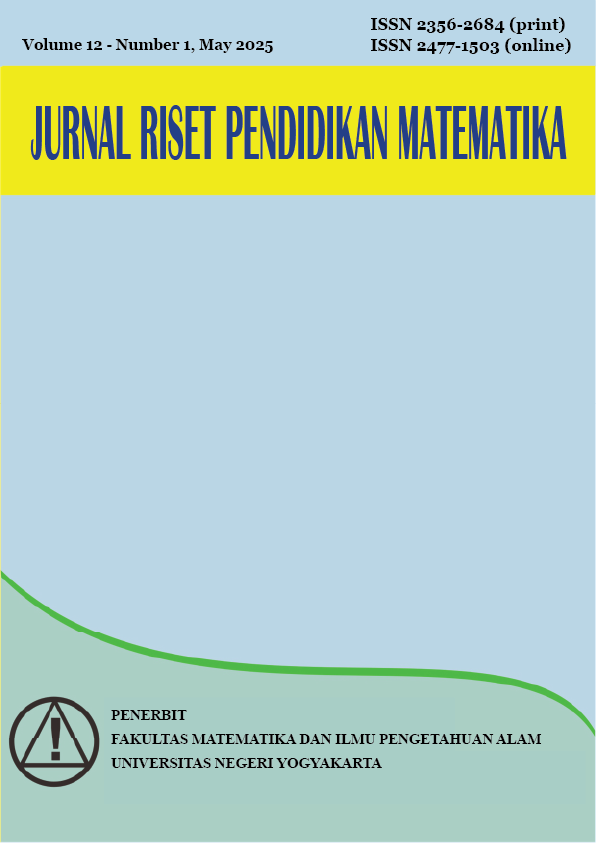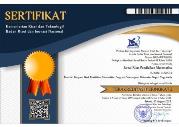The Effect of Realistic Mathematics Education Approach to Improve Students' Mathematics Learning Outcomes
DOI:
https://doi.org/10.21831/jrpm.v12i1.76685Keywords:
Realistic Mathematics, Students' worksheets, Learning Outcome, Learning ResultsAbstract
Learning outcomes are influenced by the process carried out during learning. The learning process is carried out by applying innovative learning models/approaches.This study aims to determine the effect of the Realistic Mathematics Education (RME) approach on the mathematics learning outcomes of grade VIII students at Siak Hulu Junior High School. Employing a development research design combined with a pseudo-experimental methodology, the research involved a population of six classes (VIII1 to VIII6). A purposive sampling technique was utilized, resulting in two selected classes: VIII3, comprising 32 students as the control group, and VIII4, also with 32 students, serving as the experimental group. The development phase produced a valid and practical student worksheet designed to facilitate the RME approach. The findings indicated that students who engaged with the RME approach demonstrated significantly better mathematics learning outcomes compared to those who experienced conventional teaching methods. Statistical analysis confirmed the effectiveness of the RME approach, suggesting that it not only enhances understanding but also improves overall performance in mathematics. This study concludes that the implementation of the RME approach positively influences the mathematics learning outcomes of grade VIII students in SMP 6 Kampar Regency, highlighting its potential as an effective pedagogical strategy in mathematics education. The research contributes to providing evidence for the adoption of realistic approaches in classroom settings to foster improved student engagement and achievement in mathematics. Recommendations for teachers to be encouraged to develop media and teaching materials that are contextualised and relevant to students' daily lives likes Trigonometry subject
References
Amir, Z., Risnawati, Nurdin, E., Azmi, M., & Andrian, D. (2021). The Increasing of Math Adversity Quotient in Mathematics Cooperative Learning Through Metacognitive. International Journal of Instruction, 14(4), 841-856. https://doi.org/10.29333/iji.2021.14448a
Andrian, D., & Wahyuni, A. (2020). Student Readiness Model Facing the Industrial Revolution
4.0. Second International Conference on Social, Economy, Education And Humanity (ICoSEEH 2019) - Sustainable Development in Developing Country ForFacing Industria, ICoSEEH 2019, 302-306. https://doi.org./10.5220/0009128703020306
Andrian, D., Wahyuni, A., & Ramadhan, S. (2022). Mathematics Teachers' Performance in the Industrial Revolution Era 4.0: A Structural Equation Model. Journal of Innovation in Educational and Cultural Research, 3(4), 554-563. https://doi./10.46843/jiecr.v3i4.236
Arsaythamby, V., & Zubainur, C. M. (2014). How a Realistic Mathematics Educational Approach Affects Students' Activities in Primary Schools? Procedia - Social and Behavioral Sciences, 159, 309-313. https://doi.org/10.1016/j.sbspro.2014.12.378
Arseven, A. (2015). Mathematical Modeling Approach in Mathematics Education. Universal Journal of Educational Research, 3(12), 973-980. https://doi.org/10.13189/ujer.2015.031204
Athar, G. (2012). Development Of Mathematical Learning With A Realistic Mathematical Education (RME) Approach. November, 978-979.
Barnes, H. (2004a). Realistic mathematics education: Eliciting alternative mathematical conceptions of learners. African Journal of Research in Mathematics, Science and Technology Education, 8(1), 53-64. https://doi.org/10.1080/10288457.2004.10740560
Barnes, H. (2004b). Realistic mathematics education: Eliciting alternative mathematical conceptions of learners. African Journal of Research in Mathematics, Science and Technology Education, 8(1), 53-64. https://doi.org/10.1080/10288457.2004.10740560
Bektaş, F., Kılınç, A. Ç., & Gümüş, S. (2020). The effects of distributed leadership on teacher professional learning: mediating roles of teacher trust in principal and teacher motivation. Educational Studies, 00(00), 1-23. https://doi.org/10.1080/03055698.2020.1793301
Chao, T., Chen, J., Star, J. R., & Dede, C. (2016). Using Digital Resources for Motivation and Engagement in Learning Mathematics: Reflections from Teachers and Students. Digital Experiences in Mathematics Education, 2(3), 253-277. https://doi.org/s40751-016-0024-6
Christiansen, I. M., & Erixon, E. L. (2021). Opportunities to learn mathematics pedagogy and learning to teach mathematics in Swedish mathematics teacher education: A survey of student experiences. European Journal of Teacher Education.
https://doi.org/10.1080/02619768.2021.2019216
Chronaki, A. (2023). Becoming citizen subject in the body politic: antinomies of archaic, modern and posthuman citizenship temporalities and the politics of mathematics education. Research in Mathematics Education. https://doi.org/10.1080/14794802.2023.2183889
Costa, M. C., & Domingos, A. (2022). Mathematics education: Promoting interdisciplinarity with science and technology. Research in Mathematics, 9(1). https://doi.org/10.1080/27684830.2022.2134628
Franklin, H., & Harrington, I. (2019). A Review into Effective Classroom Management and Strategies for Student Engagement: Teacher and Student Roles in Today's Classrooms. Journal of Education and Training Studies, 7(12), 1. https://doi.org/10.11114/jets.v7i12.4491
Gijsbers, D., de Putter-Smits, L., & Pepin, B. (2020). Changing students' beliefs about the relevance of mathematics in an advanced secondary mathematics class. International Journal of Mathematical Education in Science and Technology, 51(1), 87-102. https://doi.org/10.1080/0020739X.2019.1682698
Gravemeijer, K., Bruin-Muurling, G., Kraemer, J. M., & van Stiphout, I. (2016). Shortcomings of Mathematics Education Reform in The Netherlands: A Paradigm Case? Mathematical Thinking and Learning, 18(1), 25-44. https://doi.org/10.1080/10986065.2016.1107821
Helstad, K., Solbrekke, T. D., & Wittek, A. L. (2017). Exploring teaching academic literacy in mathematics in teacher education. Education Inquiry, 8(4), 318-336. https://doi.org/10.1080/20004508.2017.1389225
Heuvel-panhuizen, M. Van Den, & Drijvers, P. (2014). Realistic Mathematics Education. Encyclopedia of Mathematics Education, 522-534. https://doi.org/10.1007/978-3-030-15789-0_170
Igbo, J. N., & Omeje, J. C. (2014). Perceived efficacy of teacher-made instructional materials in promoting learning among Mathematics-Disabled children. SAGE Open, 4(2), 1-6. https://doi.https://doi.org/10.1177/2158244014538431
Isrok'atun, & Rosmala, A. (2021). Model-model Pembelajaran Matematikan (Bunga Sari Fatmawati,
Ed.). PT. Bumi Aksara
Karim, S., Ma'rufi, & Ilyas, M. (2021). Pembelajaran Kooperatif Tipe Stad Dalam Meningkatkan Prestasi Belajar Matematika Ditinjau Dari Kreativitas Belajar Matematika Siswa Kelas IV SD. Proximal: Journal of Mathematics Research and Mathematics Education, 4(2), 108-115. https://doi.org/10.30605/proximal.v4i2.1370
Klein, A. S., Beishuizen, M., & Treffers, A. (1998). The Empty Number Line in Dutch Second Grades: Realistic Versus Gradual Program Design. Journal for Research in Mathematics Education. 29(4), 443-464. https://doi.org/10.2307/749861
Laurens, T., Batlolona, F. A., Batlolona, J. R., & Leasa, M. (2018). How does realistic mathematics education (RME) improve students' mathematics cognitive achievement? Eurasia Journal of Mathematics, Science and Technology Education, 14(2), 569-578. https://doi.org/10.12973/ejmste/76959
Liu, S., & Hallinger, P. (2018). Principal Instructional Leadership, Teacher Self-Efficacy, and Teacher Professional Learning in China: Testing a Mediated-Effects Model. Educational Administration Quarterly, 54(4), 501-528. https://doi.org/10.1177/0013161X18769048
Maclinton, D., & Andrian, D. (2022). Pengembangan Media Pembelajaran Prisma Berbasis Macromedia Flash Dengan Desain Pembelajaran Assure. Mathematics Innovation (Inomatika), 4(1), 83-97. https://doi.org/10.35438/inomatika.v4i1.323
Makonye, J. P. (2014a). Teaching Functions Using a Realistic Mathematics Education
Approach: A Theoretical Perspective. International Journal of Educational Sciences, 7(3), 653-662. https://doi.org/10.31901/24566322.2014/07.03.27
Makonye, J. P. (2014b). Teaching Functions Using a Realistic Mathematics Education Approach: A Theoretical Perspective. International Journal of Educational Sciences, 7(3), 653-662. https://doi.org/10.31901/24566322.2014/07.03.27
McMillen, J. D., Swick, S. D., Frazier, L. M., Bishop, M., & Goodell, L. S. (2019). Teachers' perceptions of sustainable integration of garden education into Head Start classrooms: A grounded theory approach. Journal of Early Childhood Research, 17(4), 392-407. https://doi.org/10.1177/1476718X19856378
Melisa. (2022). Siapa Bilang Mengajar Matematika Sulit (Guepedia/kr, Ed.). Guepedia.
MZ, Z. A., Risnawati, R., Kurniati, A., & Prahmana, R. C. I. (2021). Adversity Quotient in Mathematics Learning (Quantitative Study on Students Boarding School in Pekanbaru). International Journal on Emerging Mathematics Education, 1(2), 169. https://doi.org/10.12928/ijeme.v1i2.5780
Nofriyandi, N., & Andrian, D. (2022). Factors that Affect Students' Mathematics Performance at Higher Education in Riau Province during The COVID-19 Pandemic. Infinity Journal, 11(2), 367. https://doi.org/10.22460/infinity.v11i2.p367-380
OECD. (2018). PISA 2018 Worldwide Ranking - average scores in mathematics, science and reading.https://factsmaps.com/pisa-2018-worldwide-ranking-average-score-of-mathematics-science-reading/#google_vignette
Prediger, S., & Neugebauer, P. (2023). Can students with different language backgrounds profit equally from a language-responsive instructional approach for percentages? Differential effectiveness in a field trial. Mathematical Thinking and Learning, 25(1), 2-22. https://doi.org/10.1080/10986065.2021.1919817
Revina, S., & Leung, F. K. S. (2021). Issues involved in the adoption of Realistic Mathematics Education in Indonesian culture. Compare, 51(5), 631-650. https://doi.org/10.1080/03057925.2019.1650636
Rezeki, S., Andrian, D., & Safitri, Y. (2021). Mathematics and cultures: A new concept in maintaining cultures through the development of learning devices. International Journal of Instruction, 14(3), 375-392. https://doi.
Saleh, M., Prahmana, R. C. I., & Isa, M. (2018). Improving The Reasoning Ability Of Elementary School Student Through The Indonesian Realistic Mathematics Education. Journal on Mathematics Education, 9(1), 41-54. 10.22342/jme.9.1.5049.41-54
Schukajlow, S., Rakoczy, K., & Pekrun, R. (2017). Emotions and motivation in mathematics education: theoretical considerations and empirical contributions. ZDM - Mathematics Education, 49(3), 307-322. https://doi.org/10.1007/s11858-017-0864-6
Setiawan, A., Mardapi, D., & Andrian, D. (2019). The Development of Instrument for Assessing Students' Affective Domain Using Self-and Peer-Assessment Models. In International Journal of Instruction (Vol. 12, Issue 3). https://doi.org/10.29333/iji.2019.12326a
Sitorus, J., & Masrayati. (2016a). Students' creative thinking process stages: Implementation of realistic mathematics education. Thinking Skills and Creativity, 22, 111-120.
https://doi.org/10.1016/j.tsc.2016.09.007
Sitorus, J., & Masrayati. (2016b). Students' creative thinking process stages: Implementation of
realistic mathematics education. Thinking Skills and Creativity, 22, 111-120.
https://doi.org/10.1016/j.tsc.2016.09.007
Stemn, B. S. (2017a). Rethinking mathematics teaching in Liberia: Realistic mathematics education. In Childhood Education (Vol. 93, Issue 5, pp. 389-393). Routledge. https://doi.org/10.1080/00094056.2017.1367230
Stemn, B. S. (2017b). Rethinking mathematics teaching in liberia: Realistic mathematics education. In Childhood Education (Vol. 93, Issue 5, pp. 389-393). Routledge. https://doi.org/10.1080/00094056.2017.1367230
Suardi, Moh. (2018). Learning and Learning (Rizky Selvasan, Ed.). Deepublish.
Sumirattana, S., Makanong, A., & Thipkong, S. (2017). Using realistic mathematics education and the DAPIC problem-solving process to enhance secondary school students' mathematical literacy. Kasetsart Journal of Social Sciences, 38(3), 307-315. . https://doi.org/10.1016/j.kjss.2016.06.001
Tompong, B. N. K. J., & Jailani, J. (2019). An evaluation of mathematics learning program at primary education using Countenance Stake Evaluation model. Journal of Educational Research and Evaluation, 23(2), 156-169. https://doi.org/10.21831/pep.v23i2.16473
Trinh Thi Phuong, T., Nguyen Danh, N., Tuyet Thi Le, T., Nguyen Phuong, T., Nguyen Thi Thanh, T., & Le Minh, C. (2022). Research on the application of ICT in Mathematics education: Bibliometric analysis of scientific bibliography from the Scopus database. Cogent Education, 9(1). https://doi.org/10.1080/2331186X.2022.2084956
Tuen Veronica Leung, W., Yee Tiffany Tam, T., Pan, W. C., Wu, C. Da, Candice Lung, S. C., & Spengler, J. D. (2019). How is environmental greenness related to students' academic performance in English and Mathematics? Landscape and Urban Planning, 181(1), 118-124. https://doi.org/10.1016/j.landurbplan.2018.09.021
Wahyuni, A. (2019). Pengaruh Pembelajaran Kooperatif Dengan Tipe Think Pair Share (TPS) Terhadap Kemandirian Belajar Matematika Mahasiswa. Math Didactic: Journal of Mathematics Education, 4, 277-286.
Webb, D. C., Kooij, H., & Geist, M. R. (2011). Design Research in the Netherlands: Introducing Logarithms Using Realistic Mathematics Education. Journal of Mathematics Education at Teachers Colleage, 2 (1), 47-52. https://journals.library.columbia.edu /index.php /jmetc/article/view/708/154
Weber, B. J., Breuer, J., & Lindmeier, A. (2023). How do school-related mathematical problems become relevant for prospective teachers in mathematics courses at university? A qualitative interview study. Research in Mathematics Education. https://doi.org/10.1080/14794802.2023.2243261
Zakaria, E., & Syamaun, M. (2017). The Effect of Realistic Mathematics Education Approach on Students' Achievement and Attitudes Towards Mathematics. Mathematics Education Trends and Research, 2017(1), 32-40. https://doi.org/10.5899/2017/metr-00093
Zetriuslita, Z., Nofriyandi, N., & Istikomah, E. (2020). The Effect of Geogebra-Assisted Direct Instruction on Students’ Self-Efficacy and Self-Regulation. Infinity Journal, 9(1), 41. https://doi.org/10.22460/infinity.v9i1.p41-48
Downloads
Published
How to Cite
Issue
Section
License
Copyright (c) 2025 Jurnal Riset Pendidikan Matematika

This work is licensed under a Creative Commons Attribution-ShareAlike 4.0 International License.

Jurnal Riset Pendidikan Matematika by http://journal.uny.ac.id/index.php/jrpm/index is licensed under a Creative Commons Attribution-ShareAlike 4.0 International License.









